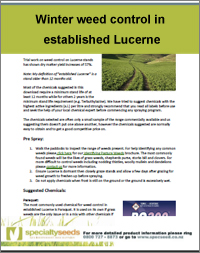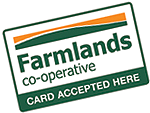 Winter weed control in established lucerne
Winter weed control in established lucerne

Weed control of established Lucerne stands is important and should be done yearly during the months of
June and
July and to a lesser degree August.
Trial work on weed control on Lucerne stands has shown dry matter yield increases of 57%.
Most of the chemicals suggested in the lucerne winter weed control download requires a minimum stand life of at least 12 months.
Click here to download the winter weed control in established lucerne brochure.
Download Link: The
Winter weed control in established Lucerne flyer.
Contact Link: Contact Specialty Seeds for any enquiries.
Back to top


As always, we hope this issue has been of some value to you. If you have a comment on this newsletter or anything on our website, please give us a call on our
Freephone: 0800 727 8873, send us an email at:
mail@specseed.co.nz.
Kind Regards

Stephen Finch & David Percival
Specialty Seeds - New Zealand
